Key takeaways:
- Concept albums, like “The Wall” and “American Idiot,” create immersive storytelling experiences that resonate with personal emotions and collective themes.
- Their emotional depth fosters connections between artists and listeners, encouraging reflection on broader societal issues and personal experiences.
- To fully appreciate concept albums, engaging deeply with the music, understanding the artist’s intentions, and exploring themes enhances the listening experience.
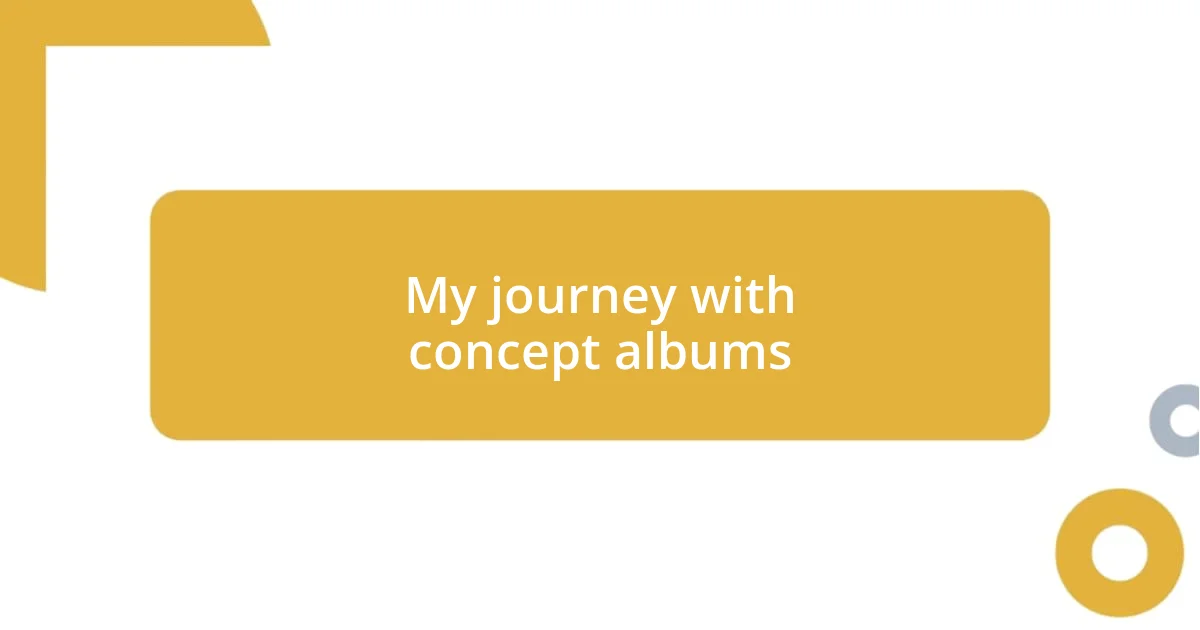
My journey with concept albums
My journey with concept albums began quite unexpectedly during my teenage years. I remember the first time I listened to Pink Floyd’s “The Wall.” It felt like stepping into a different world, where every song told a piece of a bigger story. I found myself asking, how can music capture such raw emotions and narratives?
As I delved deeper into the realm of concept albums, I discovered that they often echoed significant moments in my life. I recall driving late at night, the haunting melodies of “American Idiot” by Green Day blasting through my speakers. Each track spoke to my youthful rebellion, making me wonder if others experienced music this way too. The way each song flowed into the next felt like riding an emotional rollercoaster, with every twist and turn reflecting my own experiences.
Today, I value concept albums for their ability to create immersive experiences. They invite me to listen not just for enjoyment but for understanding, inviting me to connect with the artist on a more profound level. Have you ever listened to an album that changed your perspective? I have, and it’s a feeling I chase every time I hit play on a new project.
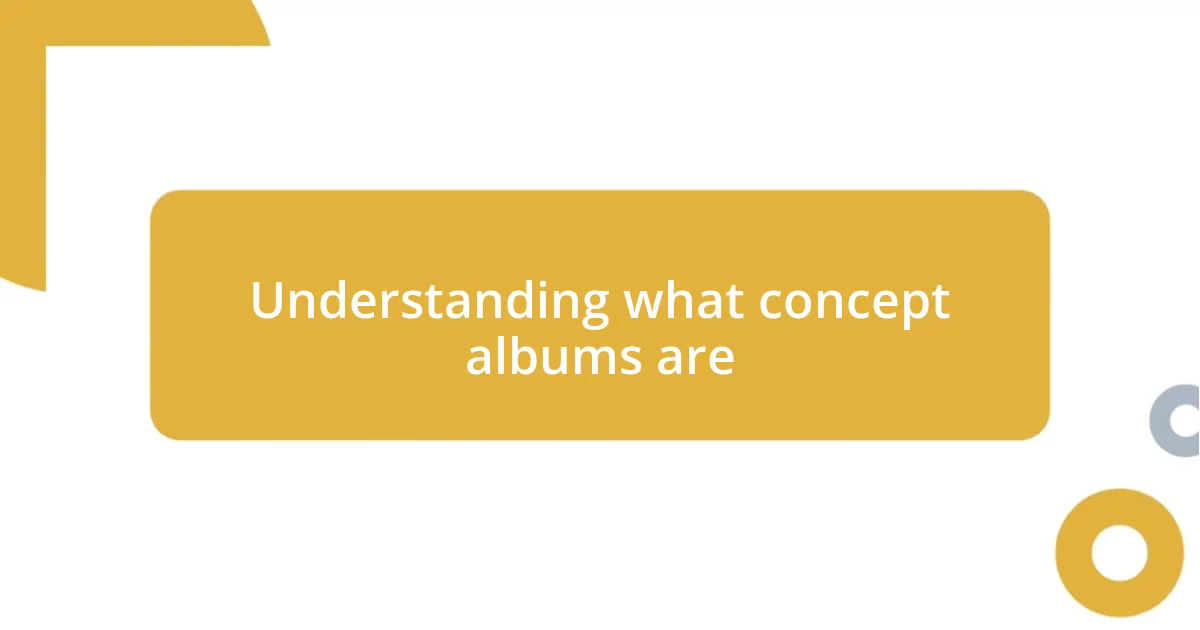
Understanding what concept albums are
Understanding concept albums is truly fascinating. At their core, they are collections of songs that revolve around a central theme or storyline. This coherence transforms an album into a narrative journey. For example, when I listen to “The Rise and Fall of Ziggy Stardust and the Spiders from Mars” by David Bowie, I’m drawn into Ziggy’s world—a mix of glam rock and futuristic storytelling that feels both personal and universal.
I remember a time when I stumbled upon “The Black Parade” by My Chemical Romance. Initially, I was drawn in by the catchy tunes, but soon I found myself captivated by the overarching concept of loss and the human experience. There’s something about experiencing an album with such depth that invites reflection. It’s as if the artist reaches out, sharing their story while encouraging us to confront our emotions.
Concept albums often reflect broader themes like identity, love, or societal issues, making them an essential part of musical storytelling. When I found myself sorrowfully singing along to “OK Computer” by Radiohead, I couldn’t help but recognize its commentary on modern life. That blend of personal and collective experience is what makes concept albums so powerful and relatable. They allow listeners to explore complex emotions, encouraging a deeper connection to both the music and the artist themselves.
| Feature | Definition |
|---|---|
| Thematic Unity | Concept albums focus on a central theme or story that ties all songs together. |
| Narrative Flow | Tracks are arranged to convey a story, creating an emotional journey. |
| Artist’s Vision | The album reflects the artist’s message or experience, allowing for deeper engagement. |
| Emotional Depth | They evoke strong feelings, often resonating with listeners on a personal level. |
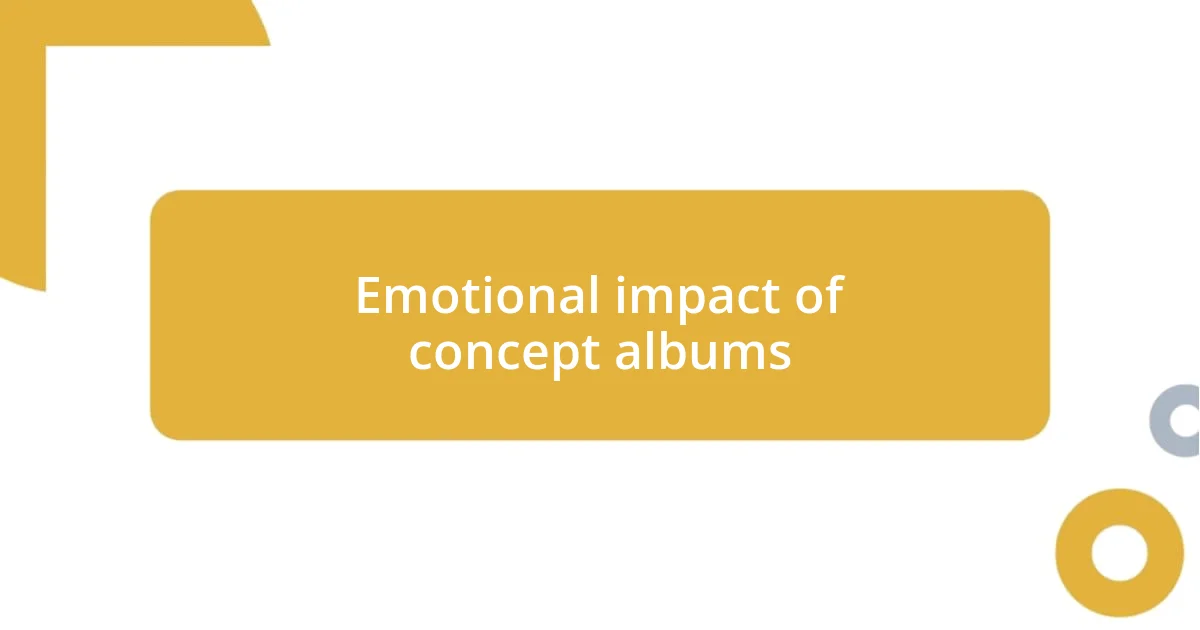
Emotional impact of concept albums
The emotional impact of concept albums is profound. When I immerse myself in a cohesive narrative woven through music, it often feels as if the artist is reaching deep into my own experiences. I recall the first time I listened to “Sgt. Pepper’s Lonely Hearts Club Band” by The Beatles; it struck me as an exploration of creativity and identity. Each song offered a glimpse into different emotions, turning an ordinary day into a reflective journey.
- They create a sense of empathy and connection, allowing us to see our struggles mirrored in the artist’s story.
- The multilayered narratives often evoke nostalgia, making listeners recall personal memories tied to moments in their lives.
- Concept albums frequently push boundaries, challenging us to confront uncomfortable emotions and societal issues, fostering personal growth.
These nuances make concept albums not just a collection of songs but a heartfelt experience that can transform how we relate to the world around us.
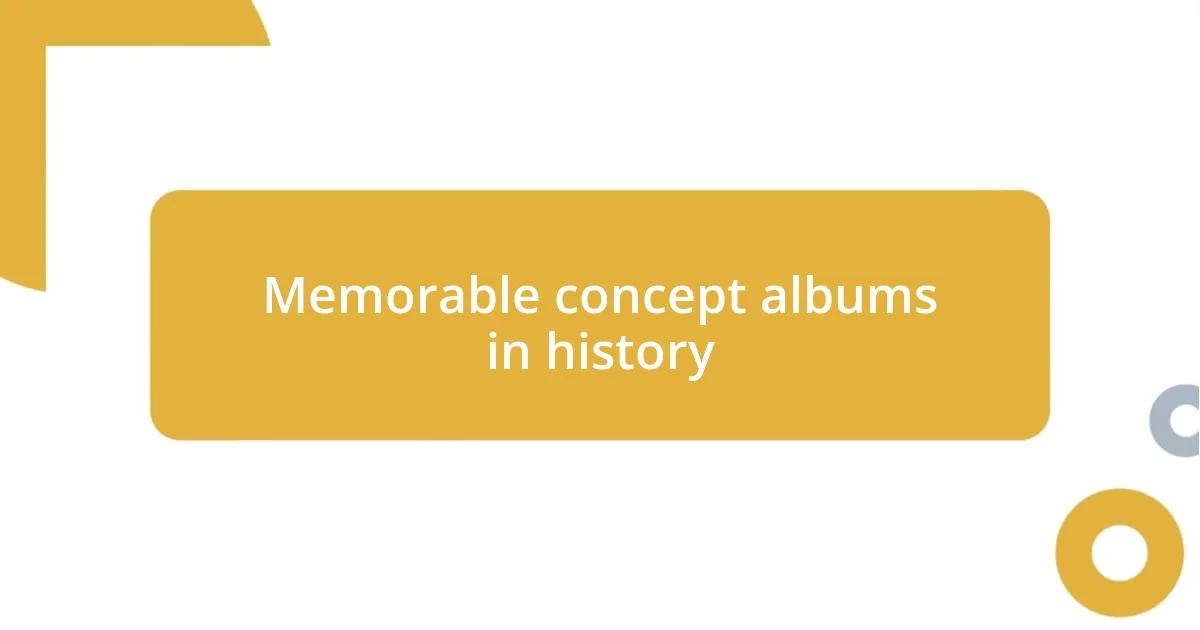
Memorable concept albums in history
When I think of memorable concept albums, “The Wall” by Pink Floyd immediately comes to mind. It’s a journey through isolation and societal critique, and I still recall the first time I navigated its surreal soundscapes, feeling both enchanted and haunted. Isn’t it fascinating how an album can encapsulate such a wide array of emotions, leaving you pondering long after the final track?
Another standout for me is “American Idiot” by Green Day. The raw energy and political angst resonated with my youthful spirit during its release. I remember blasting it from my speakers, feeling a rush of empowerment as I connected with its themes of rebellion and disillusionment. It’s amazing how music can translate collective frustrations into a powerful narrative, don’t you think?
Lastly, I can’t overlook “Children of Bodom’s” “Follow the Reaper.” This album not only showcases incredible musicianship but also tells a haunting tale of love and loss. Every riff feels deeply personal, leaving me reflecting on my own experiences with heartache. It’s as if the melodies wrap around you, making the listening experience intensely intimate. Each of these albums demonstrates how a cohesive theme can create a gripping emotional rollercoaster that’s hard to forget.
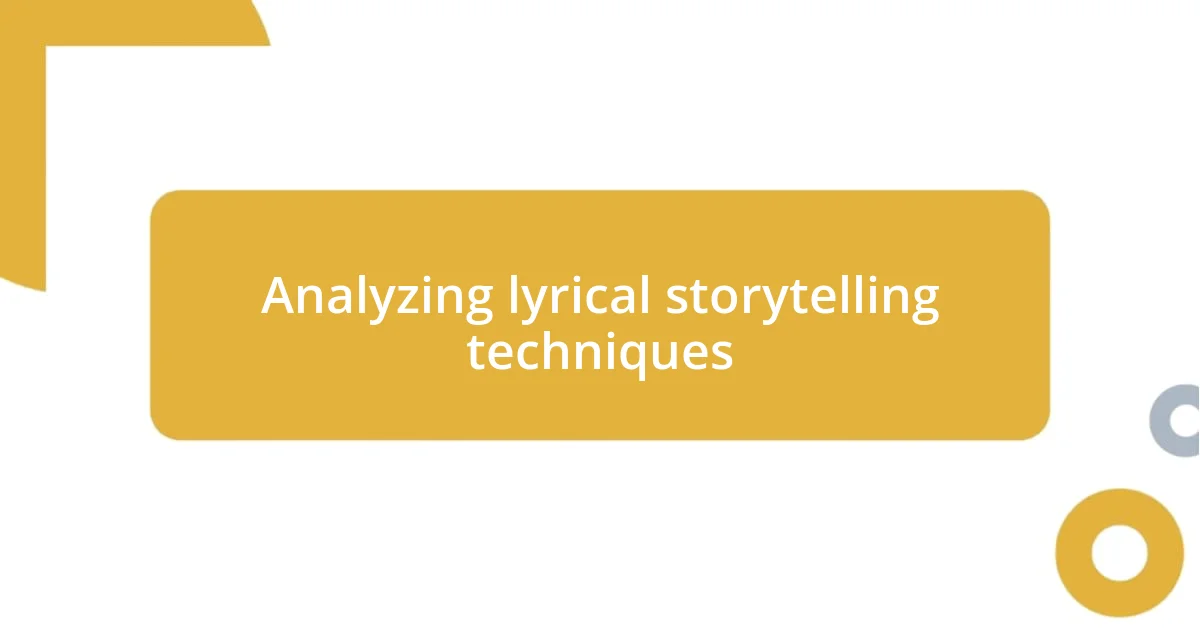
Analyzing lyrical storytelling techniques
Analyzing lyrical storytelling techniques reveals how artists craft intricate narratives that resonate deeply with listeners. Take, for instance, the way an artist structures a song to tell a story that unfolds layer by layer. I remember feeling particularly moved by “Good Kid, M.A.A.D City” by Kendrick Lamar—his use of vivid imagery to depict his upbringing in Compton felt almost cinematic. Each verse rolled out like scenes from a movie, making me feel as though I was walking in his shoes for a brief moment.
Moreover, vocal delivery plays a crucial role in enhancing these narratives. Artists often experiment with different tones and emotions, drawing listeners into the story. In Janelle Monáe’s “The ArchAndroid,” her shifts in pitch and style heightened the stakes of each lyrical twist. It’s fascinating how one line can shift from joy to despair, making you reflect on times in your own life where you’ve experienced similar swings. Have you ever noticed how a simple inflection can change the entire meaning of a song?
I also appreciate the use of recurring motifs or symbols throughout concept albums. For example, the recurring train imagery in “The Last Shadow Puppets’” “Everything You’ve Come to Expect” helped tie various stories together in a fluid manner. I found myself contemplating the significance of these symbols, reflecting on how they mirror experiences in my own life. Don’t you find it intriguing how a single visual element can evoke a range of emotions, challenging listeners to engage more deeply with the music?
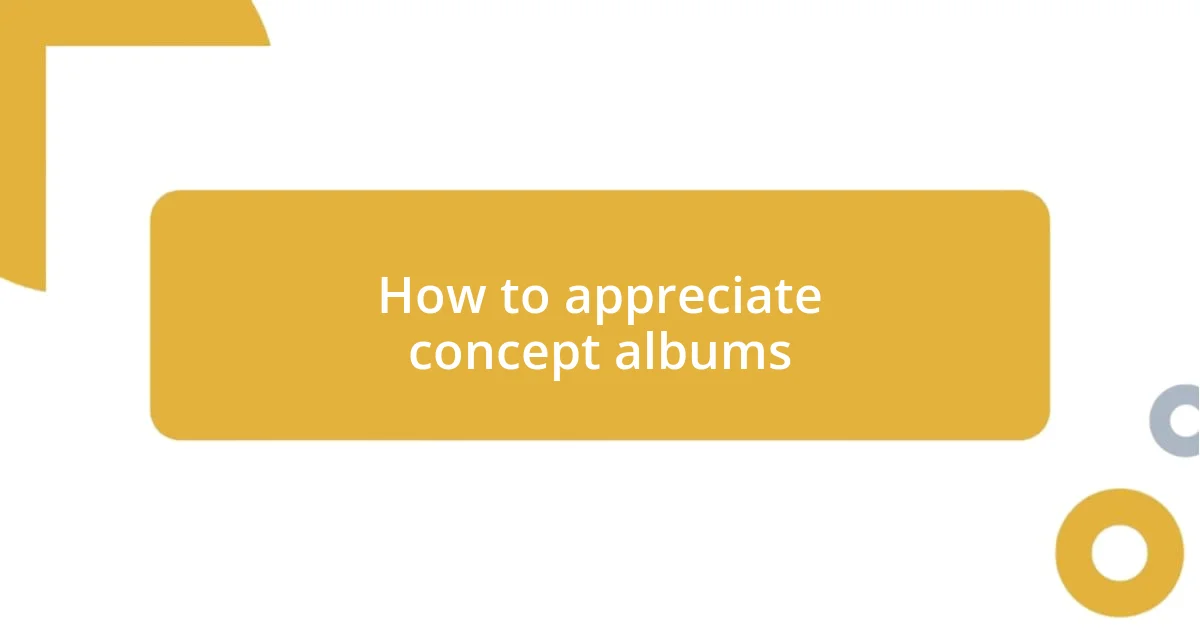
How to appreciate concept albums
To appreciate concept albums, I often suggest immersing yourself fully in the listening experience. This means setting aside distractions, perhaps finding a cozy spot with your favorite beverage. I vividly remember sitting in my dimly lit room, headphones on, as I delved into “Sgt. Pepper’s Lonely Hearts Club Band.” The music flowed around me like a vivid dream, and I felt each song’s narrative literally transport me to another world. Have you ever given yourself that time to really engage with an album?
Another effective approach is to explore the artist’s intentions and the themes woven throughout the album. I recall doing some research on “The Rise and Fall of Ziggy Stardust and the Spiders from Mars” by David Bowie. Understanding Bowie’s exploration of fame, identity, and alienation enriched my appreciation for the intricacies of the narrative. It was enlightening to connect those themes with the character of Ziggy, sparking a wave of realizations about my own perceptions of stardom. What themes resonate with you?
Finally, don’t shy away from analyzing how the music complements the story. With “The Who’s” “Tommy,” for instance, the integration of operatic elements enhances the storyline, creating a dramatic tension that elevates the entire experience. I distinctly recall a moment when the song “Pinball Wizard” left me exhilarated, blending captivating storytelling with remarkable musicianship. Each note felt like a piece of the puzzle falling into place. How have you found music and narrative intertwining in your own favorite albums?
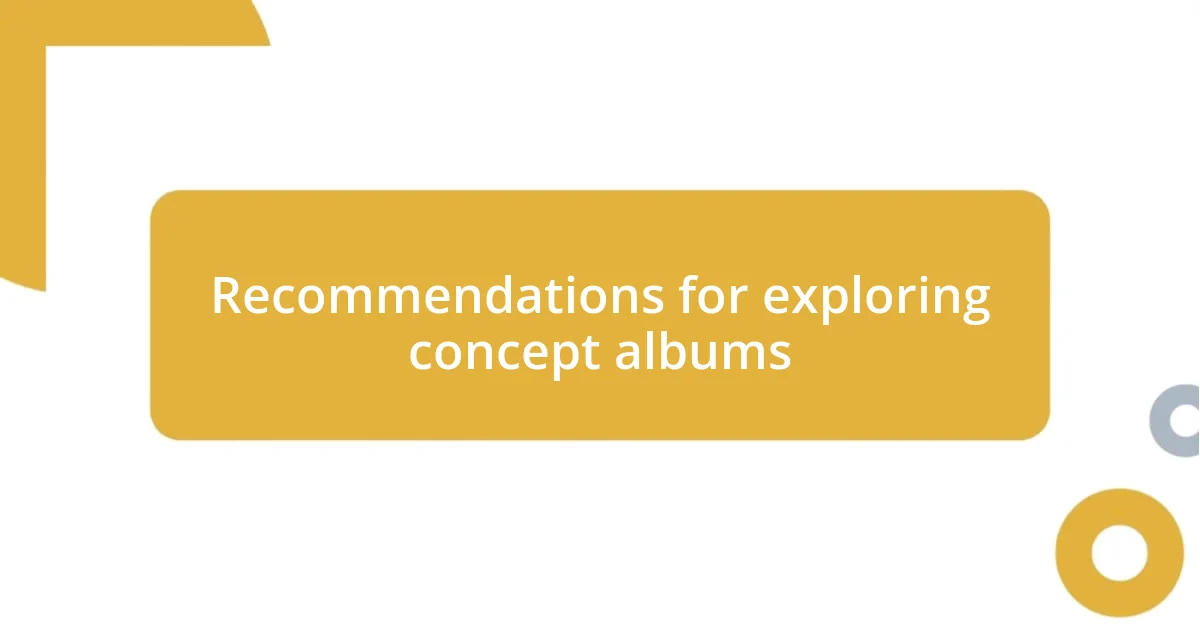
Recommendations for exploring concept albums
One of my favorite ways to explore concept albums is by taking the time to listen to them in a single sitting. I once did this with Pink Floyd’s “The Wall,” and it was like embarking on an emotional rollercoaster. I found myself reflecting on the themes of isolation and self-doubt in a way that felt almost cathartic. Have you ever experienced such a transformative journey through music?
I also suggest looking for live performances or documentaries about the album. Watching David Bowie perform “Ziggy Stardust” live added layers to my understanding of the character and his extravagant glam persona. Seeing the visual representation of the concept helped me connect the dots between the music and its broader cultural impact. Isn’t it fascinating how visuals can breathe life into an album?
Lastly, I enjoy sharing these albums with friends and discussing our interpretations afterward. I remember hosting a listening party for Radiohead’s “OK Computer” and hearing everyone’s unique take on the technological anxieties the album addresses. Engaging in discussions like these not only deepens your appreciation but also opens your eyes to perspectives you might not have considered. How do the opinions of others shape your musical experience?














